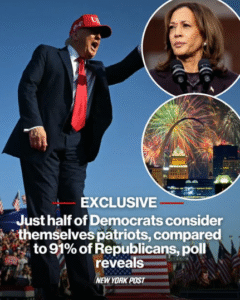A new poll reveals a striking divide in how Americans from different political parties view patriotism. According to the survey, only about half of Democrats — 51% — say they consider themselves “extremely” or “very” patriotic. In contrast, a staggering 91% of Republicans describe themselves that way. The findings highlight the growing political and cultural polarization in the United States, especially regarding national identity and pride.
The poll, conducted ahead of Independence Day, asked respondents about their feelings toward America and what patriotism means to them. Among independents, the results showed a more moderate stance, with around 62% identifying as patriotic, though not to the same intense degree as Republicans.
Analysts suggest several factors behind this divide. Many Democrats express concerns about systemic issues such as racism, inequality, and threats to democracy, which can temper their sense of national pride. For some, being critical of the country’s flaws is itself a form of patriotism, rooted in a desire to improve the nation. Meanwhile, Republicans tend to emphasize traditional values, military strength, and American exceptionalism, leading to a stronger identification with patriotic sentiment.
Generational differences also play a role. Younger Americans, who skew more liberal, are less likely to view patriotism in traditional terms. Older voters, particularly within the Republican base, maintain a more consistent and enthusiastic view of American greatness.
The poll also found variations in what each group believes patriotism entails. For many Republicans, it means loyalty to the flag, support for the military, and pride in America’s history. For Democrats, it often includes civic responsibility, social justice, and holding leaders accountable. These differing definitions help explain why people from opposite sides of the political spectrum can feel so differently about the same word.
This growing gap has real implications for national unity. While patriotism once served as common ground across political divides, it now seems to reflect deeper ideological and cultural rifts. Experts warn that if Americans can’t agree on what patriotism means, it may become harder to build consensus on the nation’s path forward.
As the country celebrates the Fourth of July, this poll underscores how divided Americans remain in their relationship to the nation itself. Whether that gap can be bridged may depend on how the next generation redefines love of country in an era marked by rapid change and deepening divides.


